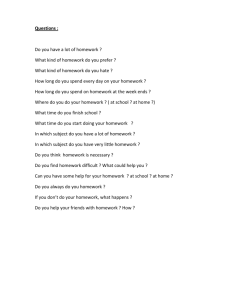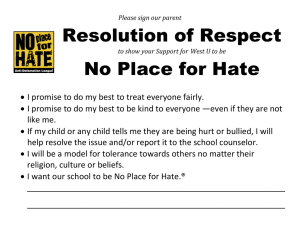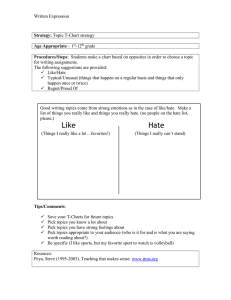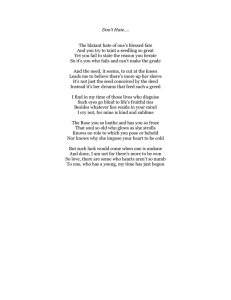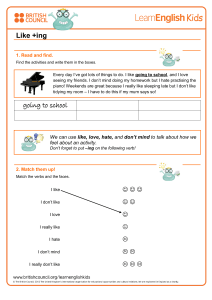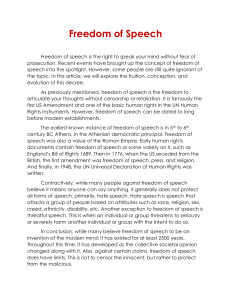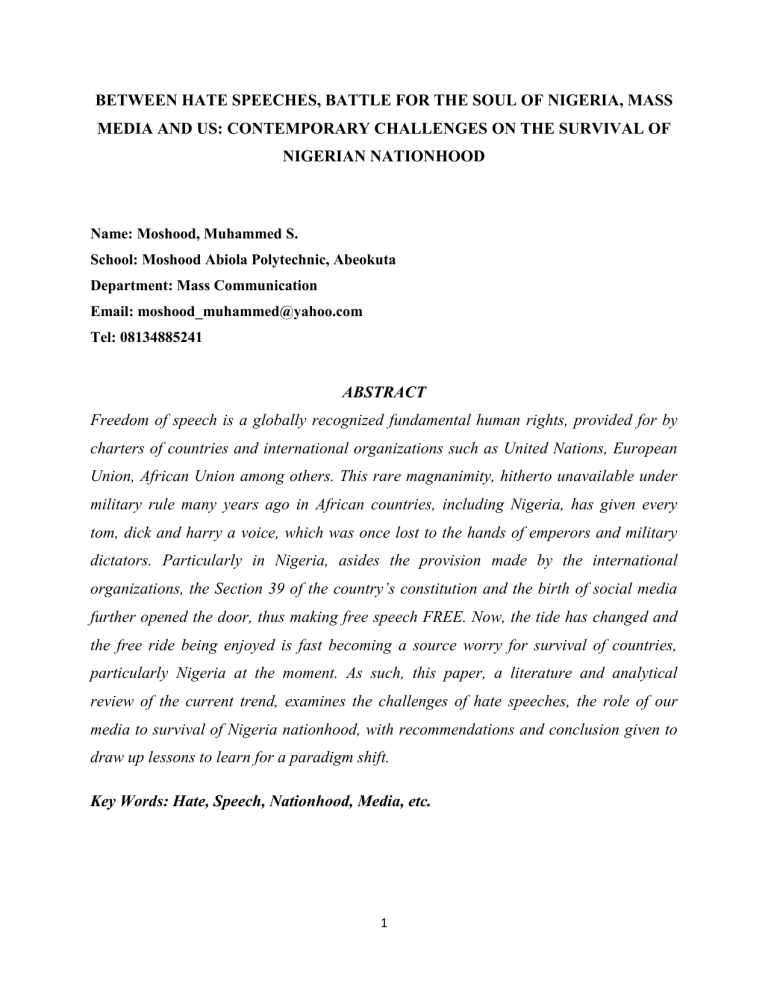
BETWEEN HATE SPEECHES, BATTLE FOR THE SOUL OF NIGERIA, MASS MEDIA AND US: CONTEMPORARY CHALLENGES ON THE SURVIVAL OF NIGERIAN NATIONHOOD Name: Moshood, Muhammed S. School: Moshood Abiola Polytechnic, Abeokuta Department: Mass Communication Email: moshood_muhammed@yahoo.com Tel: 08134885241 ABSTRACT Freedom of speech is a globally recognized fundamental human rights, provided for by charters of countries and international organizations such as United Nations, European Union, African Union among others. This rare magnanimity, hitherto unavailable under military rule many years ago in African countries, including Nigeria, has given every tom, dick and harry a voice, which was once lost to the hands of emperors and military dictators. Particularly in Nigeria, asides the provision made by the international organizations, the Section 39 of the country’s constitution and the birth of social media further opened the door, thus making free speech FREE. Now, the tide has changed and the free ride being enjoyed is fast becoming a source worry for survival of countries, particularly Nigeria at the moment. As such, this paper, a literature and analytical review of the current trend, examines the challenges of hate speeches, the role of our media to survival of Nigeria nationhood, with recommendations and conclusion given to draw up lessons to learn for a paradigm shift. Key Words: Hate, Speech, Nationhood, Media, etc. 1 INTRODUCTION When Martin Luther King Jr said; “Darkness cannot drive out darkness, only light can. Hate cannot drive out hate, only love can do that”, Nigerians in their view never bought into the idea. Rather, they chose it the other way round. Hate speech has always been there, but it took a dramatic turn in the build up to the 2015 General Elections and it remains with us till date. Then, caution was thrown into the wind and modesty spanner got lost in the can of oil of exuberance by many, including the supposed highly placed individuals, public office holders inclusive, in their usage of words on other people. This saw many prophecies by those tagged as “agents of doom” pronounce the break-up of Nigeria while international community had their attention shifted to happenings in the country. Asides the ethnic nationality coloration hate speeches has successfully courted, religious individuals, groups, mass media and online platforms have also lent shameful dancing steps into the trend, whether overtly or covertly. Mass media platforms, both traditional and the new media, owned, managed by politicians and their allies have been used in doing the BAD JOBS. Two years into the leadership of the country, led by the President Buhari, the trend has continued unabated. And no doubt, it has become widely spread like a fire during harmattan - it has become a norm, to the regret of the current leadership of the country. It has however taken a new dimension, especially as the call for a sovereign state of Biafra by Indigenous People of Biafra (IPOB) goes into head. Another was the Kaduna Declaration by some Arewa youths, giving the Igbos October 31st deadline to leave the North. This attracted heavy criticism with spontaneous statements from other sectional groups. Bearing in the mind the challenges some of these statements have tossed up for the country, this paper became a necessity. Hence, the paper dissects issues associated with 2 the spreading use of hate speeches among Nigerians, moral and what they mean for the survival of the much touted indivisibly strong Nigeria. LITERATURE REVIEW HOW IT ALL STARTED Hate speech did not just start yesterday. It began with a well conceived intention to aid interaction through the exchange of notable signs and symbols for human communication. These communication patterns are what translated into what is known today as speech. That is why Aina (2006:1-2) state that communication is essential to human existence. This position confirmed the inevitability of human communication to human survival as social animals within a society. Citing a popular American slang expression, Man cannot not communicate, Aina (Op cit) added that communication as it stands can serve many purposes, depending on how it is deployed. The continuous use of these codes interaction made popular the concept of social interaction, socialization, as others may call it among people of different background. That is one of the functions of communication as enumerated in the Macbride Commission, cited in Aina (op cit). Generally, freedom of speech is the right to articulate one's opinions and ideas without fear of government retaliation or censorship, or societal sanction. The term freedom of expression is sometimes used synonymously, but includes any act of seeking, receiving and imparting information or ideas, regardless of the medium used (https://en.wikipedia.org/wiki/Freedom_of_speech, Accessed 29/06/2017). In addition, freedom of speech includes the right to receive, withhold and impart information to others, via any platform, either orally, verbally, print, broadcast, among others. Freedom of information became popular and widely acceptable across the world mainly aftermath of the horrible experience of the Second World War and as contained in a 1976 European Court of Human Rights judgement, involving Handyside v. the United 3 Kingdom, to be the need to entrench the principle of democracy. Though, the laws may be different from country to countries, but, one think is similar to all, that is the right of every individual to have a voice. Infact, international organizations pioneered the propagation of the struggle for protection of human rights. This was led by provision of Article 19 in the Universal Declaration of Human Rights, in 1948, recognized in international human rights law; Article 10 of the European Convention Rights of 1950; Article 19 of the International Covenant on Civil and Political Rights (ICCPR), 1966; Article 13 of the American Convention on Human Rights and Section 39 (1), tagged Right to freedom of Expression, of the 1999 constitution of the Federal Republic of Nigeria, etc. One thing to note about all of these laws is that they asides that they all share similar positions, there is resemblance of words and stand for the survival of free expression by all. Meanwhile, similar to the above constitutional and legal provisos is the Convention on the Elimination of all forms of Racial Discrimination (CERD), 1965. This UN authorization framework was more interested in the “rights not to be discriminated against in any form”, a close ally, to some extent to the propagation of free speech. PERSPECTIVES ON HATE SPEECHES With free speech vigorously canvassed for and made an international law, Nigerians and indeed citizens of the world enjoyed a free ride sequel to the constitutional support for the spread of this fundamental human rights have now resorted to use of provocative statements in driving home their points on any issues. Though, the meaning of hate speech is widely disputed according to laws of societies and the perspectives being considered. Gagliardone, Gal, Alves and Martinez (2015) state that hate speech refers to expressions that advocate incitement to harm (particularly, 4 discrimination, hostility or violence) based upon the target’s being identified with a certain social or demographic group. It may include, but is not limited to, speech that advocates, threatens, or encourages violent acts. For some, however, the concept extends also to expressions that foster a climate of prejudice and intolerance on the assumption that this may fuel targeted discrimination, hostility and violent attacks. According to Wikipedia, the free Encyclopedia, hate speech is a speech which attacks a person or group on the basis of attributes such as race, religion, ethnic origin, sexual orientation, disability, or gender (https://en.wikipedia.org/wiki/Hate_speech, accessed 29/06/2017) Use of Hate speech pervades in societies of the world, though with varying, different and or with related undertones and degrees. While Nigeria was almost engulfed in a civil war in the build up to the 2015 general elections, which saw supposed patriots sharply divided over ethnic, religious lines in what should be a “national contest”, devoid of ethnical coloration, with the world attention shifted to it, the United States of America also had its share of the horrible experience in an election that saw the emergence of a Republican Donald Trump presidency. Even though the two countries managed to pass through the heated polity, almost ‘unhurt’, there are experiences of such that have left nightmarish memories in the world. They are Guatemala 1960, Bosnia 1992, Rwanda crisis of 1994, Kenya 2007, Somalia, among others. Asides the dangers of a possible civil war, as highlighted above, Gagliardone et al (2015) say hate speech lies in a complex nexus with freedom of expression, individual, group and minority rights, as well as concepts of dignity, liberty and equality. It must be stated notwithstanding that endurance for any of the views articulated in the view by these individuals are synonymous to a call to anarchy. Either way, however, the danger looms! Furthermore, hate speech on its own can be an infringement on the right or safety of another person as well as the state. Section 45 of the 1999 constitution of Federal Republic provides for this. 5 Explaining the nature of hate speech, Tulkens (2013) noted that hate speech is becoming a crucial social and political problem in many states which can no longer be ignored. Ignorance and indifference foster hate speech. To this end, many Nigerian past leaders, stakeholders have continued to call for unity among different ethnic and religious lines, from whom hate speeches have become a resounding mesmerizing songs. Apparently worried over the situation were two former leaders of the country, Rt. Gen. Ibraheem Badamasi Babangida and Former President Goodluck Jonathan when they warned against actions that could heighten insecurity in the state. They feared such situation may lead to another examples of the Rwandans, Sudanese, and Somalians experience of a resultant effects of what started as unchecked hate speeches. Both leaders were reported to have made their comments in a news report by ThisDay Newspaper on June 27, 2017. A disappointed Babangida, on the incautious use of hate speech among Nigerians said: “The management of conflicts is the acid test of maturity, of mutual livelihood and of democratic governance. We cannot and we must not allow the current hate atmosphere to continue to freely pollute our political landscape unchecked…” Goodluck Ebele Jonathan observed: “We should always use this period to know that the unity of the country is paramount. We cannot develop as a nation; no matter how the people demonstrate, and no president can perform magic if there is so much tension in the land. This is because immediately there is a sense of insecurity in any country investors go back, and when investors go back, of course your economy will be doomed. What improves the economy is confidence and what makes investors to have confidence is peace. Nobody wants to invest where there is no peace, except those that invest in arms and ammunition” 6 THE MEDIA AND HATE SPEECHES The place of mass media in modern days of loads of activities cannot be undermined. Confirmation this position, Paul, Singh and John (2013) say Mass media have a prominent role to play in modern society. It can bring about radical changes and improve social situation as it influences our social, civil, cultural, political, economic and aesthetic outlook; modernization has converted media into an indispensable feature of human activity. Raufu (2011) says mass media is the modern means of giving information to a large number of people. It includes especially radio and television as well as the printed matter comprising of newspaper, magazines, periodical and paperbacks. According to Moshood (2016), media of mass communication is in branches. In other words, there are two broad categories of the mass media of communication viz-a-viz Print and Broadcast. Supporting this view is Otunba, Odedeji, Alakija and Rauf (2009) cited by Moshood (op cit) when they noted that books, newspapers, magazines are called the print media, while Radio, Television are referred to as the broadcast media. The authors further noted that CDs, Cassettes, tapes, video tapes, etc. are also included in the electronic category. These examples do not leave out the internet, or social media which fall under the electronic category. Mass media, saddled with the responsibility of ensuring unity and social cohesion as noted by Parsons (1951) cited in Rauf and Odedeji (2016) puts it, including the online platforms have also lent shameful dancing steps into the trend, whether overtly or covertly. Media platforms owned and controlled by politicians and their allies have been used in doing the bad jobs. More recently, social media have become the new hotbed, as the popularity of the internet-facilitated communication platform has further promoted this ugly trend. Anonymous, wrongly attributed messages are spread across, either cautiously misleading or unconsciously popularized by various individuals, with a view to sowing ember of discord among various nationalities and groups making up the country. 7 As noted by Gagliardone et al (op cit), hate speech online is not intrinsically different from similar expressions found offline, there are peculiar challenges unique to online content and its regulation. Those challenges related to its permanence, itinerancy, anonymity and cross-jurisdictional character are among the most complex to address. Hate speech can stay online for a long time in different formats across multiple platforms, which can be linked repeatedly. As Andre Oboler, the CEO of the Online Hate Prevention Institute, has noted, “The longer the content stays available, the more damage it can inflict on the victims and empower the perpetrators. If you remove the content at an early stage you can limit the exposure. This is just like cleaning litter, it doesn’t stop people from littering but if you do not take care of the problem it just piles up and further exacerbates Economic downturn and the need to survive in the face of hardship have further compounded the woes of media operators and practitioners. In the words of Aina (2002:47), advertisement maintains its position as the traditional major source of funds for all media. True to it, very few copies of newspapers are sold in recent time; broadcast operators rely on airtime sales and commercials to stay in business, among other innovations. All these factored together saw the “heavy” use of mass media in sales of hate speeches days before the 2015 general elections. Aina (Op cit) citing some privately own dailies in face of the current trend in survival of the realities of the moment alluded: “…have to a various degrees, become viable commercial projects operating with the guiding principle of ‘business first, service last’”. Now that the mass media, the supposed watch dog of the society have become vulnerable in a bid to survive, truth and fairness, some of canons of mass media may be, if they have not been at all, up for sale. Then, the press is as good as becoming the underdog of a minority. One of such cases that defined the “desperation” of forth estate to survive is the use of first page of a national daily, Punch Newspaper, for an advertorial sponsored against the 8 then presidential candidate of All Progressive Congress, Muhammadu Buhari by Governor of Ekiti state, Mr. Ayodele Fayose. Though, no ethical line was crossed, but, such a page could have taken a very important story on a Monday, January 19, 2015. Also, if not for anything at all, the wordings of the advertorial could have condemned it into the trash bin. A school of thought however argued that Punch Newspaper must have been wooed by the “huge” amount of money involved to publish the advert that almost took the country on its ahead, considering that the presidential elections was a few weeks ahead. However, while many of the hate speeches bothered not so many people - the political actors, atleast to clear their names and sanitize the system in the process, one person did. And that was the former governor of Lagos state and National Chieftain of All Progressives Congress, Asiwaju Bola Tinubu. He sued Daar Communications Plc (AIT) for defamation of character, owing to the repeated broadcast of a television documentary titled; “Lion of Bourdillon” in March 2015 while the case was later settled and AIT “begged” Tinubu in April, 2017, after about a year of legal battle. In the letter of apology submitted to Tinubu, AIT did not only retract its “inciting” statements, but praised Asiwaju. As reported by Punch Newspaper on April 1, 2017, it reads; “DAAR Communications Plc acknowledges that Asiwaju Bola Ahmed Tinubu is an outstanding political leader of unblemished character and integrity, as well as a leading public figure and opinion-moulder, who has made and continuous make immense contributions to the progress and development of the nation in general and Lagos State in particular. “DAAR Communications Plc admits that in airing the said documentary, it had no intention, whatsoever, to embarrass or diminish the high reputation of Asiwaju Bola Ahmed Tinubu which it respects and attests to.” 9 The above event shows that there are legal frameworks available for prosecution of use of hate speeches. The law however, since the ravaging spread of hates started had not taken its course. CHALLENGE OF NATIONHOOD IN FACE OF HATE SPEECHES: A NIGERIAN EXAMPLE Merriam-webster Dictionary (online) aptly defines nationhood as the state of being an independent nation. A nation is from the Latin word, natio, to mean people, tribe, kin, genus, class, flock, is a large group or collective of people with common characteristics attributed to them — including language, traditions, customs, habits, and ethnicity. By comparison, a nation is more impersonal, abstract, and overtly political than an ethnic group. It is a culturalpolitical community that has become conscious of its autonomy, unity, and particular interests (https://en.wikipedia.org/wiki/Nation, Accessed 30/06/2017) Thus the phrase "nations of the world" could be referring to the top-level governments (as in the name for the United Nations), various large geographical territories, or various large ethnic groups of the planet. Depending on the meaning of "nation" used, the term "nation state" could be used to distinguish larger states from small city states, or could be used to distinguish multinational states from those with a single ethnic group. Nigeria got her independence in 1960 after a successful movement by a few Nigerians from the hands of the Britain government. Before this time, the country was former two different protectorates, merged in 1910 by Governor General, Lord Lugard and given the name “Nigeria” by his wife – Flora Shaw Lugard. Since then, Nigerians despite differences have lived together for over a century, only for the peace being enjoyed to be trivialized by no other persons but Nigerians themselves. 10 Campaign of calumny, derogatory statements, advertorials, and all sorts have become arrows in the hands of the ruling class, opposition figures, secessionist separatists, religious bigots among others. They fly freely, from all corners across the polity,before, during and after elections. Religious and traditional leaders are not left out of dastard and divisive prone act. A king in Lagos state, with reference to the state’s governorship election and in a bid to make his choice candidate known made a statement that caught a serious backlash across the country. That was the magnitude of the shameful act, it did not spare the highly revered stool of an Oba - king, a well respected position in the land. Secession separatists from the South East have not stopped asking that they allow to go while the Northern youths under the aegis of Arewa Youth Consultative Group have also given an ultimatum for the Igbos leaving in the nineteen Northern states to leave. This declaration, though condemned by the Kaduna state government, in which state the statement was released, ordered the arrest of the youths. Some elders in the region have lent support to the group’s quit notice while serious criticism has befell the youths’ stance. Someday To this end, some Nigerians, including Rt. Gen. Babangida, Deputy Senate President, Senator Ike Ikweremadu, Asiwaju Tinubu among numerous others have called for a restructure of the country so as to douse the tension generated by call for the break up of Nigeria, considering the allegation of marginalization among many other reasons given by the secessionists’ movement for their action In a move to curtail the brewing tension, the Acting President, Yemi Osinbajo has met with stakeholders across different regions with a promise to reach out to warring groups. SUMMARY OF FINDINGS Having discussed some of the issues generated by the use of hate speeches among Nigerians, the following are the findings made: 11 1. Hate speeches are mostly politically motivated. Though, they do have religious, sectional coloration as well as personal intonation. 2. Most of the issues emanating from hate speeches witnessed overtime are a fall out of perceived marginalization of a particular group. Political scientists refer to such agitations as normal, as they all are targeted towards ensuring the control of resources. In other words, the agitations are purely political. 3. The security operatives and other law enforcement agencies have been made a sleeping baby on laps of political actors. Most times, they play lip services and make threats of arrests on pages of newspapers. 4. The media have been greatly used, owing to the power they have to reach large, heterogeneous, and scattered audiences at once. 5. Economic challenge has further made media and their practitioners vulnerable. 6. Government negligence to plights of the aggrieved aggravated the spread of hate. CONCLUSION AND RECOMMENDATIONS The issue of hate speech has thrown up two schools of thought. While one wants hate speech banned, the other does not. The former’s position is said to be informed by the need to “sanitize” the society usually thrown into possibilities of war, no thanks to use of abusive, degrading, defaming, negative stereotyping against a people based on members of the opposite ethnic, political and religious groups. The latter’s view is predicated on the fear that a ban on what is sometimes termed as hate speech will be a suffocation of “reality”, fair play, and ultimately a confrontation on the rights of individuals to freely express themselves so provided for. Either way, however, the laws that provided for freedom of speech in Nigeria and other places placed the restrictions to it, side by side. With that, it is expected that any violation 12 of any of the law would buy a weighty legal knocks for whosoever errs. But, reverse in most instances is the case, perhaps due to political or whatever reasons. In view of the foregoing and considering the dangers inherent in the ugly monster of dangers of hate speech rearing its head, the following are hereby recommended: 1. The government and its various agencies should ensure that a proper orientation of Nigerians is done; 2. Political office holders should not pleasure in crisis for their political gains. The statement by the former President Goodluck Jonathan; “my ambition is not worth the blood of any Nigeria” should resonate and be imbibed by all, regardless of aspirations. 3. Law enforcement agencies should employ the relevant sections of the country’s constitution in prosecution of ANY individual who uses, promote hate speeches, regardless of how highly place such may be, including social media users. Afterall, Nigeria, the giant of Africa and most populous black-skinned state in the world is not a lawless country. Law should be made to take its course! 4. Religious, traditional and sectional leaders should be cautioned; they should serve as worthy peace ambassadors to their followers, preach tranquility and ensure grievances are settled without raising dusts. 5. Even IF there will be a break away, as being clamoured in some sections of the country, it should be civilly done. Like a sound fellow once sounded, wars are no picnics! 6. Mass media, beyond the reportage of the provocative, divisive vituperations and counter backlash should employ other journalistic tools in managing the challenges of hate speeches. The all-time powerful should not fail in its social and developmental responsibilities. As Parsons (1951) cited in Rauf and Odedeji 13 (2016) put it, mass media should help the society in the achievement of social cohesion functions through the performance of its own functions of information, education and entertainment. 7. Nigerians must also see the call for oneness, unity and peace of the country as a collective business and assignment. Also, messages that are capable of undermining the relative peace being enjoyed by the country must be discouraged and shunned by all. 8. Media operation in the country should be strengthened and further empowered by the government, but not to control it. 9. Media regulatory bodies should make efforts to step up their laws and ethical provisions to accommodate the new challenges hitherto not provided for. 10. Federal government and indeed all tiers of government in Nigeria should be fair and just in appointments and projects execution so each and every region in their jurisdiction will be well served. With this, no one will complain of marginalization. Government is of the people. 14 REFERENCES Aina, S. (2002): Modern Media Management. Abeokuta: Ebensun Publishers. Aina, S. (2006): Interacting With Others: Perspectives In Interpersonal Communication, Abeokuta: Ebensun Publishers. Alike, E. and Ezigbo, O. (2017): IBB Backs Restructuring as Jonathan Urges Caution Against Hate Speech, via https://www.thisdaylive.com/index.php/2017/06/27/ibb-backs-restructuring-asjonathan-urges-caution-against-hate-speech/ European Court of Human Rights (2017): Fact Sheet – Hate Speech (March 2017), Press Unit, Unite de la Presse Gagliardone, I.; Gal, D.; Alves, T. and Martinez, G. (2015): Countering Online Hate Speeches, UNESCO Publishing, Paris; de Fontenoy, Moshood, M. (2016): An Assessment of the Roles of Mass Media in Promotion of Sports Betting among Nigerians, An Unpublished HND thesis submitted to the Department of Mass Communication Paul, V., Singh, P. and John, S. (2013): Role of Mass Media in Social Awareness, International Journal of Humanities & Social Sciences Vol 1 (01) August 2013 Raufu, G. (2011): Mass Media and the Society: Issues & Perspectives. Abeokuta: Kagor International, Raufu, G. and Odedeji, A. (2011): Sociology of the Media – A Reader, Lagos; Meek Associates Otunba, T.G.; Odedeji, A; Alakija, F. and Raufu, G. (2009): Sociology of the Media, Abeokuta: Meek Associates. United States Holocaust Memorial Museum (2009): Hate Speech and Group-Targeted Conflicts: The role of Speech in Violent Conflicts. Washington D.C Merriam-Webster (2017): https://www.merriamwebster.com/dictionary/nationhood https://en.wikipedia.org/wiki/Nation https://en.wikipedia.org/wiki/Hate_speech https://en.wikipedia.org/wiki/Hate_speech https://en.wikipedia.org/wiki/Freedom_of_speech http://punchng.com/ait-apologises-to-tinubu-over-lion-of-bourdillon/ 15
